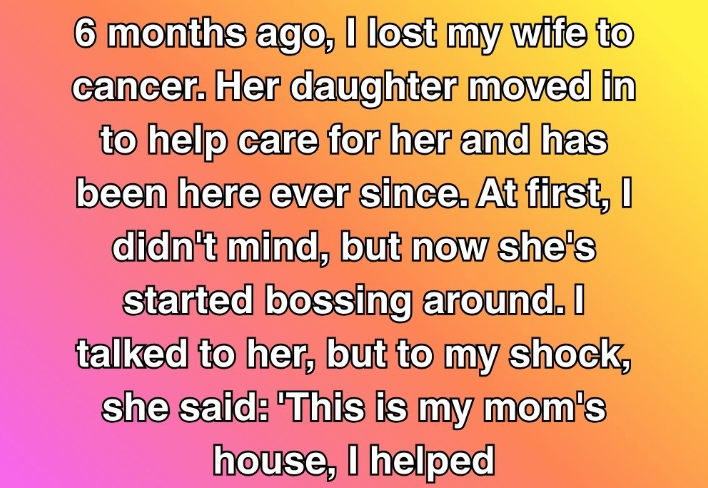Six months ago, my wife, Kavitha, succumbed to cancer. Her daughter, Priya, moved in to assist with her care and has remained ever since. Initially, I welcomed her presence, but over time, she began asserting control over my daily life. I addressed the issue with her, only to be stunned by her response: “This is my mom’s house. I helped.”
Her words struck me like a physical blow. This house belonged to Kavitha and me, built through fifteen years of marriage. I refinanced it to cover her medical expenses, maintained the property, and paid every bill. I believed Priya, Kavitha’s daughter from her previous marriage, respected that reality.
She didn’t.
After Kavitha’s passing, the house grew silent, heavy with her absence. Her jasmine-citrus perfume lingered faintly. Priya stayed, offering support, and I appreciated it. She prepared meals, kept the place orderly, and helped sort through Kavitha’s belongings. But as weeks stretched into months, her presence shifted from comforting to commanding.
She reorganized the living room without consulting me, introduced her own furniture, and relegated Kavitha’s cherished chair to the garage. One morning, I discovered she’d changed the locks, claiming it was “for safety.” When I challenged her on these actions and other subtle oversteps, she declared, “This is my mom’s house. I helped.”
I stood there, speechless, wondering if I’d become a stranger in my own home.
I tried to remain understanding. Priya was mourning, too. I convinced myself her behavior stemmed from grief. But her actions intensified.
She began dictating my grocery purchases—favoring tofu over red meat. She claimed the guest room, then transformed the den into her personal office. She hosted a weekly book club with unfamiliar, boisterous guests, never asking my permission. I felt like an outsider in the home I’d shared with Kavitha.
Then came the issue with the mail.
I received a notice that my utility autopay had been canceled. A call to the company revealed someone with my last name had altered the account. Priya admitted she’d “updated” it to “modernize” things.
“Don’t you want my help, Raj?” she asked. “You’ve seemed so adrift since Mom passed.”
Her tone—patronizing, almost triumphant—grated on me. Still, I held back, not wanting to clash with Kavitha’s daughter, who’d endured her own loss.
But the breaking point arrived when I overheard her on a call, casually laughing as she told someone, “I’ll probably keep the house. Raj is too detached to care.”
Keep the house? As if it were hers to claim?
I couldn’t sleep that night. I realized my grief and guilt had allowed me to become passive, letting Priya overstep. Her pain didn’t justify her actions.
The next morning, I retrieved the deed.
My name alone was on it.
Kavitha and I had agreed long ago, when she moved into my home after our wedding, to keep ownership straightforward. If anything happened to her, the house was mine, and vice versa. She trusted me to look after Priya, not surrender my home.
I made copies of the documents and sat Priya down.
“We need to talk seriously,” I said.
She barely glanced up from her phone. “We already did. I told you—I’m handling things.”
“Handling my house,” I replied, steady but resolute. “This isn’t your house. Your name isn’t on the deed. You don’t pay rent or make decisions here without my consent.”
That caught her off guard.
Her eyes sharpened. “I was here when you shut down. I cooked, cleaned, cared for Mom. You’d be lost without me.”
“I valued your help,” I said. “But it doesn’t give you ownership. If you stay, we need clear boundaries. Otherwise, you’ll need to find your own place. I’ll help with a deposit if you need it.”
She stared, shocked, then stormed upstairs.
I thought that settled it, but a week later, a lawyer’s letter arrived. Priya was challenging the house’s ownership, claiming Kavitha had verbally promised it to her and that she’d contributed to its upkeep.
I sat with the letter, heart racing. Was she really taking this to court?
I hired a lawyer, showed him the deed, mortgage records, and payment history. He shook his head. “Her case is weak, but she can drag this out and make things difficult.”
And she did.
She grew cold at home, brought her boyfriend, Tyrese, over, who parked his motorcycle on my lawn. She cooked only for them and stopped speaking to me. I felt like I was living with an antagonistic roommate.
My lawyer proposed mediation to avoid court. We met in a neutral office downtown. I hoped Priya sought closure or a symbolic gesture, but her demeanor—sunglasses indoors, chewing gum dismissively—told me otherwise.
She demanded half the house’s value.
“I can stretch this out for years,” she warned. “You’re retired. Do you want to spend your later years in legal battles?”
I stayed silent, but her entitled tone—so unlike the thoughtful girl I’d known at 17—left me unsettled.
I didn’t yield.
Instead, I had my lawyer offer three months’ rent for a new apartment and moving expenses. Accept or decline.
She declined.
The next day, she posted about me online, labeling me a “heartless stepfather” and “grief exploiter,” claiming I was evicting her from her mother’s home. Her words were crafted to garner sympathy. Old acquaintances messaged me, some upset, others puzzled.
It stung, but I held my ground, knowing the truth.
Two weeks later, Kavitha’s sister, Mina, called. “I saw Priya’s post,” she said. “Can I visit?”
She arrived with mango sweets and sat at our old kitchen table, where we’d once shared laughter. Her gaze was warm but piercing.
“Priya’s struggling,” she said. “But you don’t owe her your peace.”
She revealed something new. Before Kavitha’s death, she’d asked Mina to intervene if Priya ever manipulated me. “She said you’d always be kind to Priya, but that kindness might be weaponized.”
Hearing that shattered me. Kavitha had foreseen this.
With Mina’s guidance, I wrote a concise public response, stating the facts: my ownership, my support during Priya’s grief, my efforts to resolve things amicably. I didn’t disparage her.
It worked. People stepped back. Some apologized for misjudging me. Within a month, Priya moved out quietly, without further posts or conflict.
I thought that closed our chapter.
But six months later, a handwritten letter arrived from Priya.
She apologized, explaining her anger, fear, and confusion after losing her mom. She said old wounds from her father’s abandonment had resurfaced, and controlling the house felt like holding onto her mother. Instead, it alienated everyone.
“I don’t expect forgiveness,” she wrote. “But thank you for loving my mom so deeply.”
I read it three times, then wept.
Grief twists us, amplifying pain and fear, sometimes causing us to hurt those supporting us. I don’t condone Priya’s actions, but I understand them more now.
We’re not close, but we’ve met for coffee occasionally. She’s in therapy, employed, and living in her own apartment. No more control games. Just two people, bound by love for Kavitha, seeking peace with the past.
Family isn’t always about blood or roles—it’s about respect. And sometimes, love means setting boundaries, not from spite, but from care—for yourself, for others, for what the departed would have wanted.
If you’ve faced something similar, you’re not alone. Grief is complex, and so are people. Healing begins when you stand firm in your truth, not to diminish others, but to honor your own light.
If this story resonated, please share it or leave a like. Someone else might find comfort in it.




